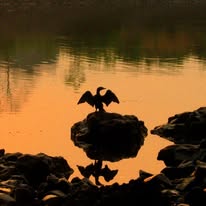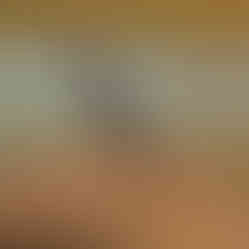Where the River Once Lived
- Rahul Karanpuriya
- Mar 27, 2024
- 5 min read
Updated: Apr 1
A Journey Through Grief, Disconnection, and the Longing to Feel Again

It was the summer of 2016; the first time I stood by the Godavari River, I expected to feel something sacred. I had heard stories growing up about her being life-giving, holy, and eternal. But what I saw that day, just outside Nashik, felt nothing like divinity. There was no sound of flowing water. No smell of soil or freshness. The river looked dead, covered in chemical foam, choked with waste. The stench made it hard to breathe. And yet, there were people in the water. Fishermen, waist-deep, casting nets into what was clearly poison.
I watched from the edge, feeling something rise inside me: shame, confusion, helplessness. I couldn’t move. I just stood there, wondering what kind of world we’ve created, where people step into toxicity just to survive, and the rest of us pass by, maybe noticing, but rarely stopping. I wasn’t witnessing just pollution that day. I was witnessing something deeper. Something inside us: the numbness, the quiet collapse of meaning, the slow disconnection from everything that once made life sacred. I came home with many questions; some were clear to me: What kind of world have we built, where people must step into poison to stay alive, and no one calls it violence?
And there were many other questions I didn’t know how to name.
The Forgotten River of My Childhood
I grew up in Bhilwara. There was a small river there, Kothari. Nothing grand. Just a river that flowed year-round. In summer, we played on its banks. In monsoon, we watched it rise with awe. During festivals, we made offerings into its waters. It was not just water; it was rhythm. Continuity. Comfort.
Today, it flows for a few weeks during monsoon, then disappears.
When I visit home now, I feel an unfamiliar stillness. Not peace but something else. A kind of silence that doesn’t soothe but weighs. Like something has gone missing, and we’ve learned to live without asking where it went. I often wonder, what else have we learned to live without?
What We’re Really Losing
I’ve travelled across India. I’ve visited many remote parts of India, places where rivers still run clear, where people still kneel before water and still talk about rivers as elders. I’ve taken dips in over twenty-five rivers across the country. Sometimes to cool off. Sometimes to remember. Sometimes because I didn’t know what else to do with my grief.

There’s something about standing in a river that humbles you. The coldness. The current. The stillness beneath the surface. It reminds you that you’re part of something older. That your life is just one note in a much longer song. Lately, that song is growing faint. Rivers are drying. Not because of nature’s cycle. But because of our choices. Our development models. Our forgetfulness. Because rivers don’t just die from pollution. They die from negligence. From disconnection. From the lie that we can live without them. I often felt a quiet fear. And I find myself asking, how long before this one dies too? What happens to a society that no longer knows how to be in relationship with the very source of life?
Listening Along the Nila
While assisting a friend designing the Nila Yatra along the banks of River Nila in Kerala, I began to understand the full weight of this loss. The people there didn’t just use the river; they belonged to it. Their stories, rituals, art, and identities flowed with her. The river wasn’t separate from them; it was part of their body, their breath, their language. And yet, like so many rivers across the country, Nila too is being wounded. Sand mining, encroachments, sewage. The stories still exist, but they’re harder to tell now. And the children, many of them don’t even know what the river once was.
There’s something profoundly heartbreaking about that. It’s not just ecological loss. It’s cultural death. It’s spiritual silence. And we are not just witnessing it. We are participating in it. We are part of the violence. And yet we rarely feel its weight.
Why?
Because we’ve built an entire culture on forgetting.
The Crisis Beneath the Crisis
I think about this a lot. Not just as someone who cares about rivers but as someone who was shaped by the very systems that are killing them. I was educated to be efficient, articulate, and productive. I was taught to look at the world through graphs, data, and impact reports. I was never taught how to grieve. Or how to apologize to a river. Or how to sit with the guilt of benefiting from a system that’s destroying the very foundations of life.
This is the heart of the meta-crisis we’re in. It’s not just climate collapse or water scarcity. It’s disconnection. It’s the psychological severing from land, from body, from spirit. It’s the normalization of numbness. The conditioning that tells us not to feel too much, not to care too deeply, not to slow down enough to listen.
Because if we did, we’d fall apart. Or maybe we finally come alive.
What the Forgotten Remember
I’ve seen people who refuse to forget.
In Odisha, the Dongria Kondh protect their forests and rivers not as activists but as children defending a parent. They don’t need environmental education. They carry ecological wisdom and intimacy in their bones. In Rajasthan, the Bishnoi remember what most of us have forgotten: that to love a tree, an animal, or a river enough to die for it is not madness but maturity.

Across India, from small villages in Maharashtra to tribal belts in the North-East, people are reviving rivers, not through technology, but through relationships, planting trees, reviving banks, and repairing ancient water channels. Quiet acts of devotion in a world that has replaced care with calculation.
These people are not behind. They are what’s left of the future.
A Mirror I Cannot Look Away From
And still, here we are, many of us, living in cities, carrying the ache of something we can’t name. The guilt of knowing we’re part of a system we can’t fully escape. The grief of watching the world unravel, one river, one forest, one tradition at a time. We feel it, even if we can’t say it. In our anxiety. In our restlessness. In the shallow way we breathe. In the loneliness we carry in crowds. In the helplessness we try to mask with ambition. And underneath all of that, the deeper question lingers: Can we still feel enough to change?
A Quiet Invitation
What do we do with this grief? What do we do with the shame of being part of the problem, even as we dream of being part of the healing? What do we do with the silence we inherited, the silence that kept us from asking hard questions in school, at home, at work?
What does it take to admit that maybe we’re not as free, as advanced, or as conscious as we pretend to be? That maybe, in our hunger for more, we’ve become something less.
That maybe the rivers are not dying alone; we are dying with them.
I don’t know how to end this reflection. Because there is no clean ending. No campaign slogan. No perfect call to action. All I can say is, I am still learning to feel. I am still learning how to carry this grief without letting it drown me. Still learning how to stay with discomfort long enough for it to become intimate with nature. Still learning how to say, I don’t know what to do, but I know I don’t want to forget.
Because the river may still be waiting. And maybe, just maybe, so is the part of us that still knows how to listen. Because healing will not come from outside systems but from inside hearts.











コメント